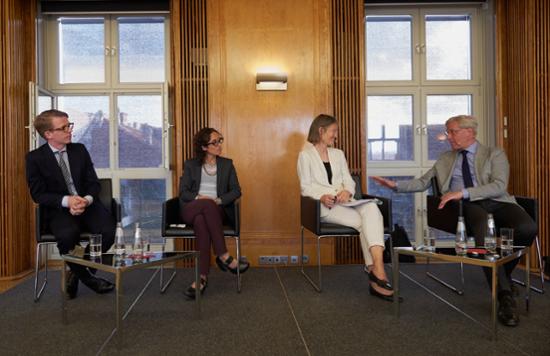Sie befinden sich hier: Institut Das Institut Büro Berlin Veranstaltungen Heidelberger Salon HD Salon 03.07.19

On July 3rd 2019, a "Heidelberger Salon" titled "Syria and Beyond. On Use of Force in International Law" brought together at the Berlin-Brandenburg Academy of Sciences a select group of academics, politicians, officials, journalists and other experts and stakeholders from various fields, among the many alumni and alumnae. The evening was also the finale of the preceding workshop "International Law as Process and Practice: A Transatlantic Conversation on Use of Force".
The panel, chaired and moderated by Anne Peters, included Monica Hakimi (University of Michigan Law School), Norbert Röttgen (Chairman of the Foreign Affairs Committee of the Bundestag) and Christian Marxsen. The panel discussion drew intensely from the variety of rich and nuanced conversations that had taken place during the day – but shifted the focus of the debate to the most recent (and contested) cases of use of force in international law, namely the US missile strikes in Syria (and the subsequent reactions by European government, including Germany).
Particular emphasis was laid on the challenges of the use of military force by democratic states, on the question of parliamentary consent, and on the question of constitutional obligations to prevent violations of international law within systems of collective security. Anne Peters referred to a recent decision of the German Higher Administrative Court Münster (OVG Münster), stating Germany’s legal obligation to see that the US does not violate international law by way of drone strikes facilitated by Ramstein airbase, derived from the constitutionally guaranteed right to life. Peters introduced also the (then) pending complaint to the Federal Constitutional Court, brought by the parliamentary oppositional faction of Die Linke (the Left Party) and arguing that, should the Federal Constitutional Court follow the broad (and fairly novel) interpretation of Article 51 of the UN Charter in the direction of admitting self-defence against armed attacks by non-state actors, this would be an inadmissible judge-driven evolution of the UN Charter, and then, this judicial law-making would no longer be covered by the initial approval of Germany's accession to the UN Charter by the federal statute of 1973, but would require a fresh approval by the legislative branch or at least by the Bundestag. Monica Hakimi, from a comparative perspective, stated that such a strong role of courts as arbiters of the constitutional legality of use of force would be unconceivable in US constitutional culture.
The largest part of the discussion was devoted to the subject of German military actions abroad (Syria, Iraq). The legality of these missions and Germany’s “responsibility to protect” were critically questioned on the panel as well as by the audience. But how can use of force be regulated in a changing world order, confronting massive power shifts and resulting changes in the international order? Norbert Röttgen emphasized that only by approaching international law as an organic and fluctuating process one could adequately and responsibly face those challenges. Monica Hakimi admitted that she recognizes the controversial conumdrum of stating the (il)legality of those missions, but pointed also to possible consequences that Germany might have to face if she heads towards unambiguous action.
In agreement with Norbert Röttgen, Christian Marxsen stressed that international law would be indeed in a process of change – and changeable. In times of profound and fast-paced legal and geopolitical changes, the question would inevitably arise, he emphasized, as to whether the Grundgesetz requires a new parliamentary approval.
The comments and questions of the diverse and numerous audience in the ensuing lively discussion critically targeted grey areas in which questions of legality of German military action have not yet been conclusively answered and therefore require clarification. Among other things, it was questioned whether a deployment would only be possible if the legal basis was clear – possibly resulting in an impasse where German foreign policy becomes inoperable. Despite multiple disagreements, there seemed to be a broad consensus as to the need for the German government to identify existing problems and to actively trigger solutions.
The evening ended with a reception on the BBAW’s roof top terrace.
Report: Aliki Kosmidis
Foto: Maurice Weiss/Ostkreuz
At the Berlin-Brandenburg Academy of Sciences (BBAW).